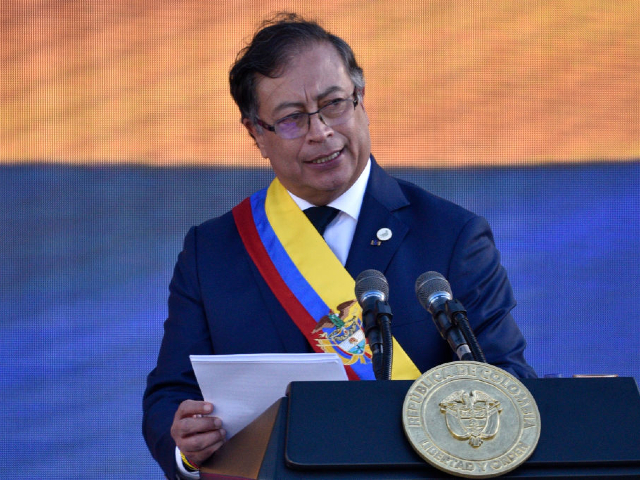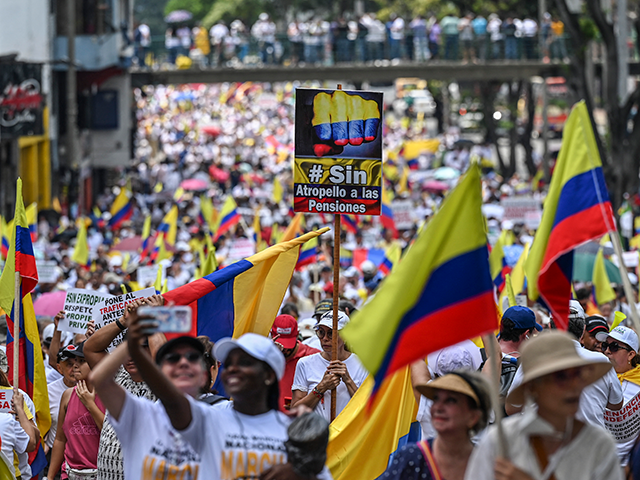Thousands of conservatives convened in at least 35 cities in Colombia on Monday to protest a series of government reforms proposed by far-left President Gustavo Petro, including tax increases to fund social programs, establishing ties with Venezuelan socialist dictator Nicolás Maduro, and building a universal health care system.
The protests were overwhelmingly peaceful and left little in the way of litter or other damage, local outlets reported, a sharp contrast to the left-wing riots and arson attacks that engulfed the nation last year.
Gustavo Petro became president of the country in August, the first left-wing president in the history of Colombia. Prior to his rise to power, he served as mayor of the capital, Bogotá, and, as a youth, was a member of the M19 Marxist terrorist organization. Following his election, Petro received an endorsement from the Revolutionary Armed Forces of Colombia (FARC), the country’s deadliest communist terrorist group.
Petro narrowly defeated rival Rodolfo Hernández in June’s runoff election, taking over a divided nation that had shockingly left conservative establishment pick Federico “Fico” Gutiérrez out of the running in the first round of voting. Gutiérrez, supported by the long-ruling conservative Democratic Center party, lost largely out of popular distaste with former President Iván Duque’s handling of the Chinese coronavirus pandemic within the country, which brought about significant economic and public health damage to the general public.

President of Colombia Gustavo Petro speaks during the presidential inauguration at Plaza Bolivar on August 07, 2022 in Bogota, Colombia. (Guillermo Legaria/Getty Images)
Monday was the first time since Petro’s inauguration that Colombia’s conservatives organized a national event against his policies. According to the Colombian magazine Semana, 35 cities saw assemblies of anti-Petro protesters organize, including nearly every major city in the country. In Bogotá, where Petro once served as mayor, over 8,000 people joined the protest. The largest protest appeared to be in the conservative heartland city of Medellín, however, where an estimated 35,000 attendees protested Petro. Police estimated that 60,000 people took to the streets of Colombia against its president nationwide, according to Colombia’s Caracol TV.
“They are not the change, they are the establishment,” one protester told Caracol TV. “We truly are the people putting a new foot forward. These are not people from any party. These are not people who can be called rich or poor. These are patriotic Colombian people.”
Protesters marched with signs bearing slogans such as “I want to be free,” “no expropriation through taxes,” and “Colombia without crime.” Some organized circles to recite the Catholic rosary in prayer for the future of the country.
One group of protesters held a banner against the United Nations’ Sustainable Development Goals, presumably meant to move the world away from fossil fuels.
“No to Petro’s Reforms — accomplice of criminal globalism that is destroying our America in the name of socialism! ‘You will own nothing and be happy,'” the banner read referring to a now-infamous prediction for 2030 by the World Economic Forum.
Environmentalism was a recurring object of protester ire at the event, as Petro has repeatedly called for the destruction of Colombia’s fuel economy. Colombia is one of the few nations in the world to be entirely energy independent as a result of never having previously had a left-wing administration in power. Crude oil and coal are Colombia’s top two exports. Petro has called for “decarbonizing” the Colombian economy and threatened to stop allowing the development of the nation’s fossil fuel resources in the pursuit of a “green” economy.
Petro has also repeatedly used his disdain for fossil fuels to argue in favor of the production of cocaine, claiming that cocaine is “less toxic” than fossil fuels. The president used his first speech before the United Nations General Assembly last week to defend cocaine, using the same logic: “What is more poisonous for humanity, cocaine, coal or oil?”
“The tax reform is a heist,” one protester told Semana, referring to Petro’s proposed tax hike to allegedly fund programs to aid the poor.
Unlike the nation’s left-wing riots that began in 2019, the conservative protesters cheered on the police, deployed en masse to ensure security.
“Long live the National Police!” protest leaders in one city shouted, according to Colombia’s newspaper of record El Tiempo.
In Barranquilla, one of Colombia’s major cities, protesters held up a sign reading “millions of reasons to take to the streets,” emphasizing that the protest was not based around any single issue.
“No to the tax reform, no to gasoline taxes, no to the invasion of private property, no to collective, no to indoctrination, no to [stealing] the money of retirees,” the rest of the sign read.
Petro acknowledged the protests Monday, sharing a photo and commending the conservatives for not engaging in violence.
“The right to express oneself will always be respected,” the president wrote. “But we will always have the right to inform when disinforming occurs. In general, the marches did not contain violence.”
Siempre se respetará su derecho a expresarse. Pero siempre tendremos el derecho a informar cuando se desinforme.
En general las marchas no tuvieron violencia. pic.twitter.com/kVFwvstbfk
— Gustavo Petro (@petrogustavo) September 26, 2022
In an apparent acknowledgment of national discontent, Petro met on Tuesday with former President Álvaro Uribe, one of the country’s most popular conservatives and the head of the Democratic Center party. Uribe’s cooperation with then-American President George W. Bush to use counterterrorism tactics against the FARC has been largely credited with significantly limiting the influence and violence of that terrorist organization in the 2000s, before the 2016 FARC “peace deal” emboldened the group and restored significant sources of income to it. Petro’s Interior Minister Alfonso Prada told reporters that Uribe sought to be part of “a constructive opposition” and described the meeting as supportive.
“We received much support from former President Uribe,” Prada said, noting that Uribe appeared most concerned with land reform projects that conservatives fear, under a socialist president, will result in the outright expropriation and theft common in Cuba and Venezuela.

COMMENTS
Please let us know if you're having issues with commenting.